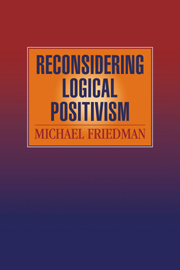Book contents
- Frontmatter
- Contents
- Foreword
- PREFACE
- INTRODUCTION
- Part One Geometry, Relativity, and Convention
- 1 Moritz Schlick's Philosophical Papers
- 2 Carnap and Weyl on the Foundations of Geometry and Relativity Theory
- 3 Geometry, Convention, and the Relativized A Priori: Reichenbach, Schlick, and Carnap
- 4 Poincaré's Conventionalism and the Logical Positivists
- Part Two Der logische Aufbau der Welt
- Part Three Logico-Mathematical Truth
- Bibliography
- Index
1 - Moritz Schlick's Philosophical Papers
Published online by Cambridge University Press: 05 June 2012
- Frontmatter
- Contents
- Foreword
- PREFACE
- INTRODUCTION
- Part One Geometry, Relativity, and Convention
- 1 Moritz Schlick's Philosophical Papers
- 2 Carnap and Weyl on the Foundations of Geometry and Relativity Theory
- 3 Geometry, Convention, and the Relativized A Priori: Reichenbach, Schlick, and Carnap
- 4 Poincaré's Conventionalism and the Logical Positivists
- Part Two Der logische Aufbau der Welt
- Part Three Logico-Mathematical Truth
- Bibliography
- Index
Summary
The appearance of these volumes is an event to be welcomed by all students of twentieth-century philosophy of science and, indeed, by students of twentieth-century philosophy generally. Together they comprise the entire corpus of Schlick's published writings (and some previously unpublished writings) on epistemology, metaphysics, and philosophy of science with the exception of his magnum opus, General Theory of Knowledge. Only Schlick's ethical writings fail to be represented exhaustively (and judging from some that are included, e.g., “On the Meaning of Life,” vol. 2, pp. 112–29, this circumstance may not be cause for regret). Particularly noteworthy are translations of some of Schlick's best and most important, yet previously untranslated, papers (I have in mind especially “The Philosophical Significance of the Principle of Relativity” (1915),vol. i,pp. 153–89, and “Experience, Cognition, Metaphysics” (1926), vol. 2, pp. 99–111) and the inclusion of Henry Brose's 1920 translation of Space and Time in Contemporary Physics(1917) (vol. 1, pp. 207–69), which has long been out of print. As a whole, we are presented with a fascinating, if somewhat chaotic picture of analytic philosophy in the making.
It must be admitted that Schlick's work has serious limitations, especially so for a twentieth-century thinker. His grasp of modern logic is imperfect at best (although he is acquainted with, and explicitly refers to, Russell's [1903] Principles of Mathematics,he devotes a considerable amount of energy in General Theory of Knowledge[§14] to arguing that all rigorous inferences in mathematics and science can be expressed as sequences of syllogisms in the mood Barbara).
- Type
- Chapter
- Information
- Reconsidering Logical Positivism , pp. 17 - 43Publisher: Cambridge University PressPrint publication year: 1999

